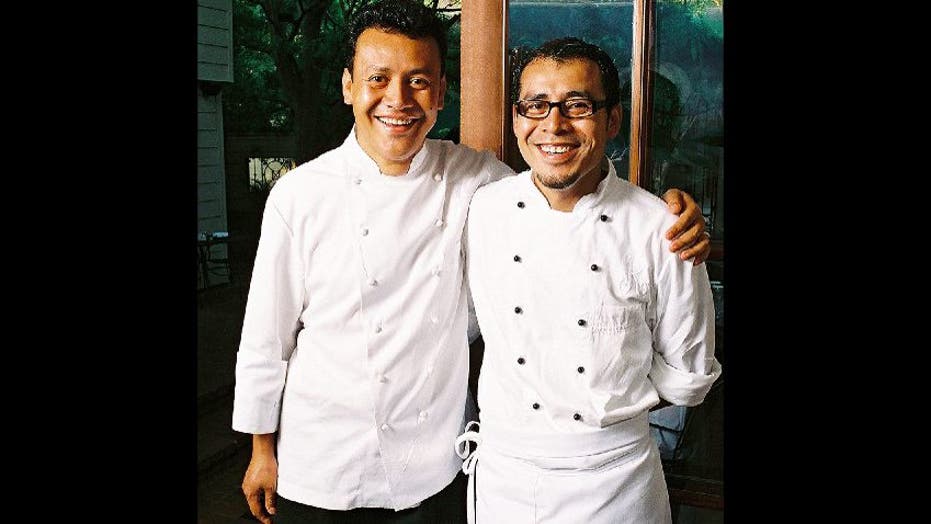– Across the United States, in all fields of endeavor, Latinos are working to uphold their place in American society. Fox News Latino is proud to present "Our American Dream," a series of snapshots and profiles of Latino success stories.
When chef Hugo Ortega prepares mole poblano, he uses his grandmother’s recipe, which he first began learning decades ago in Mexico.
“Not in the sense that I was thinking one day I’d be a cook. I learned it because it was part of my labor,” he says.
After arriving illegally in Houston, Texas in 1983, Ortega worked as a dishwasher and line cook – a far cry from earlier tasks like toasting cacao. But life slowly led Ortega back to his Mexican roots. Like his abuelita, he had a knack for cooking. He got a green card, went to culinary school and eventually became a citizen and an executive chef. Finally in 2002, he opened Hugo’s, his restaurant offering home-style Mexican dishes elevated to upscale, sophisticated fare.
Since then, Hugo’s has received numerous accolades: The Houston Press named it “Best Restaurant” in the city in 2003. Ortega received the award for “Chef of the Year” at the 2011 Houston Culinary Awards presented by local magazine My Table in early October.
Photos: Hugo's Award Winning Dishes
“George and Barbara Bush have been sighted at Hugo's, along with Houstonians with a yen to discover sophisticated, modern Mexican food,” wrote the New York Times in 2003.
Did this industry give a lot of satisfaction over the years for my family? I think you’re damn right about that.
Born in poor eastern Mexico City near the airport, Ortega credits one person in particular for helping him on his journey from jobless immigrant to celebrated chef. Since the 1980s, he has worked at Backstreet Cafe, a much-loved Houston eatery offering “New American” fare – there, he not only found his calling, he found his wife too. ,
The couple, who now have a 14-year-old daughter, have different recollections about exactly when they got together, but it happened around the late 1980s or early 1990s.
“Tracy was the whole world for me. She was a companion. After all, I was homeless for a few months [in Houston], and then I found someone who cared about me,” says Ortega, who is now executive chef/owner of both Backstreet Cafe and Hugo’s.
Jokingly, good friends will “say well, you did it the smart way…,” he says, “But the bottom line is, it has nothing to do with that.”
As the couple geared up to open their newest restaurant, Vaught suggested they call it “Hugo’s,” according to Ortega. Years before, for a culinary school project, Ortega had planned a mock restaurant, also given that name – though he never actually expected it to end up on the sign where he was cooking.
Ortega and others worried Houstonians wouldn’t embrace the Hugo’s concept – an honest-to-god Mexican place, where a waiter didn’t immediately drop off complimentary chips and salsa.
Vaught says the new restaurant aimed to offer the kind food Ortega “was used to eating, which he said was Mexican food. And all I’d ever had was Tex-Mex, so I didn't really understand what the difference was. And so that interested me...”
When the place opened, some patrons did expect the same staples found in other local “Mexican” restaurants, says Ruben Ortega, Hugo Ortega’s brother and the pastry chef for Backstreet Cafe and Hugo’s.
“Some people would say ‘well you know what, I’d like fajitas. Do you have fajitas?’ or ‘Do you have chiles con queso?’ or ‘Do you have taco salad?’ So we were kind of freaking out,” says Ruben Ortega.
Ultimately, the restaurant made a name for itself though – next year it will be celebrating its ten-year anniversary, after all.
Over time, Vaught and Ortega’s restaurants have employed a number of Hugo Ortega’s family members, helping some to become accomplished career chefs. Ruben, who first immigrated to California, initially worked in Houston at Backstreet and Vaught’s other restaurant, Prego, then moved on to other local spots and eventually returned to his brother’s restaurants. Another sibling, Jose Luis, also worked at the restaurants. He’s now chef at a resort in Belize.
Today, Ortega has relatives working in cooking, maintenance, hostessing and various other jobs at his restaurants, and others have gone onto a wide variety of culinary careers. Though he’s mostly modest about his impact, Ortega’s pleased that so many of his family members have built fulfilling careers in the food industry.
“They came and helped me and they saw what it is,” he says. “Did this industry give a lot of satisfaction over the years for my family? I think you’re damn right about that.”
Of course, it has been something of an exchange.
When Hugo wanted to learn his family’s mole poblano recipe, he remembered a couple aspects of it – but also missed a few pieces. “The tradition in those years was that the grandmother would pass the recipe to the daughter and the daughter to the granddaughter,” he says.
So naturally, he turned to the necessary people: his mother, a few aunts and other relatives.
“And that’s how we put together recipes,” he says.
Click here for more good news stories.
Ruth Samuelson is a freelance reporter in Mexico City. She can be reached at ruth.samuelson@gmail.com.
Follow us on twitter.com/foxnewslatino
Like us at facebook.com/foxnewslatino





















